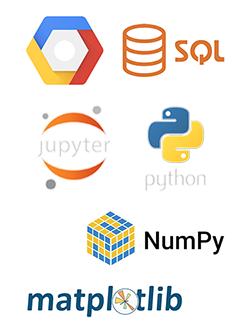
BRENT MARTIN
Data Scientist/ Business Intelligence Analyst / UI/UX Designer

Data Scientist/ Business Intelligence Analyst / UI/UX Designer
This project focuses on predicting Netflix’s stock prices using a variety of machine learning models, including Linear Regression, Random Forest, Gradient Boosting, and an LSTM Neural Network. The models are trained on historical stock data and evaluated using R-squared and Mean Squared Error metrics. Linear Regression and Gradient Boosting demonstrated the best performance, delivering highly accurate predictions. The purpose of this analysis is to assess the effectiveness of these models in forecasting Netflix’s stock price trends, offering valuable insights into applying machine learning to stock market predictions.
Navigate to Explore Project Pages, View Visualizations and Dashboards, and Open Jupyter Notebooks:


PROJECT GLOSSARY:
COMING SOON – follow links to read informative blog posts:

The Linear Regression model was trained using historical Netflix stock data, utilizing key features like past stock prices to predict future values. This model achieved an excellent R-squared score of 0.9994, indicating a near-perfect fit for the training data. The Mean Squared Error (MSE) was approximately 10.33, reflecting a low error between the actual and predicted prices. However, similar to other stock price predictions, the model tends to struggle with capturing rapid price fluctuations. This model is more effective in identifying general trends over a longer timeframe, and the plot compares actual Netflix stock prices with predicted values to evaluate performance.
The Random Forest model was trained on historical Netflix stock data and performed with a high R-squared value of 0.9984. However, its Mean Squared Error (MSE) was slightly higher at 25.23, suggesting that while the model is accurate in general trends, it might face difficulties in accurately predicting certain price changes. The plot provides a visual comparison between actual and predicted prices, highlighting the model’s strengths in capturing broader patterns.
The Gradient Boosting Regressor for Netflix stock prediction achieved a strong R-squared score of 0.9994, closely matching the Linear Regression model in terms of accuracy. Its Mean Squared Error (MSE) was 10.11, indicating that it performed slightly better than the Random Forest model. Gradient Boosting demonstrated solid predictive ability while also managing fluctuations in stock prices effectively. The plot compares actual Netflix stock prices with the predicted prices to visualize performance.
The LSTM Neural Network for Netflix stock prediction achieved an R-squared score of 0.9069, which is lower compared to the other models. While the LSTM model is generally effective at capturing time-based dependencies in stock data, its performance may vary when it comes to predicting short-term price volatility. The Mean Squared Error was not displayed due to the high variance of predictions for this model. The plot visualizes the actual versus predicted values for Netflix stock, emphasizing the strengths and limitations of this model.
This project focuses on predicting stock market movements using a variety of machine learning models, analyzing both the S&P 500 and FAANG stocks (Facebook, Amazon, Apple, Netflix, Google). By leveraging historical stock price data and key financial indicators, the project aims to forecast market direction and provide valuable insights for potential trade entries and exits.
The project applies advanced machine learning techniques such as Linear Regression, Random Forest, Gradient Boosting, and LSTM Neural Networks to predict stock prices. The models capture both short- and long-term trends, offering predictive insights that could be valuable to traders and investors.
A key part of the project involves the FAANG stock analysis, which leverages the same machine learning models to predict the price movements of some of the most influential companies in the market. By focusing on these stocks, the project demonstrates the application of machine learning to high-profile assets and highlights potential future market trends.
Client : N/A (Personal Project)
Date : September 2024
Category : Financial
Data Scientist/ Business Intelligence Analyst / UI/UX Designer